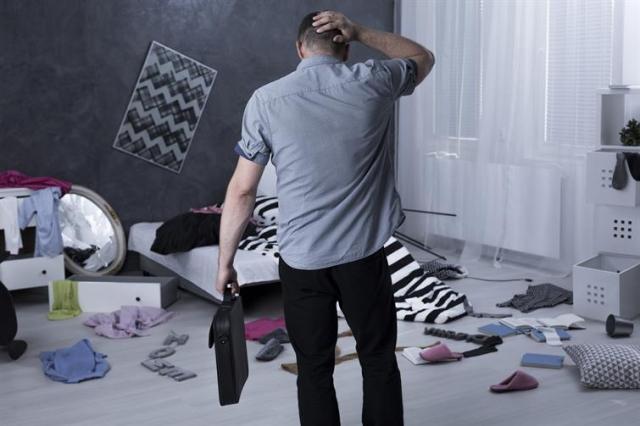It’s not a situation you ever want to be in, but defending yourself with knowledge of burglary prevention techniques and your renter’s insurance policy can help you be better prepared if it does. It’s not a good feeling when someone makes their way into your home uninvited. ConsumerAdvocate.org reports that 65% of residential burglaries occur during the day when most residents aren’t home. While the number of burglaries continues to decrease – according to the FBI – it’s good to know the steps to take if something like this were to happen.
If your apartment was burglarized, and you’ve notified the police and your landlord about the break-in, you might be wondering what to do next. The thought of, “Who’s responsible for paying the damages?” sets in. In most cases, the insurance company will issue you a check to replace your belongings. Sometimes, though, it’s not all black-and-white and there may be some discrepancy regarding who’s responsible.
My apartment was burglarized: who pays?
Generally speaking, your renter’s insurance will pay for the damages, but sometimes that’s not always the case. If a police report is required for filing a claim, your insurance is most likely looking for any indication of fault – either by you or your landlord.
A landlord could be liable if there’s evidence he/she lacked due care in protecting the apartment. For example, say you had reported a broken window latch to your landlord three weeks ago and it was never fixed. Then, you get robbed and the police determine the thief came in through the window with the broken latch. This would be seen as negligence by the landlord, and your insurance company may go after him/her to pay for your belongings.
But say you knew the latch was broken and never reported it to your landlord, your insurance could deny your claim because of your negligence. When you do go file a claim for the theft, make sure you have the police report, your policy number, and phone number ready for the claim representative.
Do I really need renter's insurance?
You would definitely benefit from a renter’s insurance policy. It’s quite affordable and many landlords actually require their tenants to have it. Perhaps you're avoiding renter's insurance because of the (albeit minimal) expense, but it’s important to understand that it’ll help cover the cost of your damaged and stolen items.
Landlords have an insurance policy of their own, but it doesn’t cover your things. The policy is used to protect the apartment from damages sustained during the burglary, such as replacing a shattered window. We mean it when we say that renter’s insurance is affordable. The average renter’s insurance is about $12 per month with a property coverage of $30,000 and liability coverage of $100,000, according to the Independent Insurance Agents and Brokers of America. When you file the claim, you’ll have to pay a deductible which is typically between $500 and $1,000.
How to protect your apartment from being hit by burglars.
Hopefully you’ll never be in this situation. But just in case, it’s vital that you know some prevention techniques to protect your apartment. The Department of Justice estimates that 3.7 million robbers break into residential homes each year, causing billions of dollars in damages. Protect your apartment with these tips:
- Inspect all points of entry. Don’t just look for the obvious, inspect all the possibilities. You may need to think like a robber would, and ask yourself about all the possible ways to enter a home uninvited. Doggy doors, weak locks, and balcony doors can motivate them.
- Add window coverings. Burglars could be surveying your home by peeking into the windows. If you have a ground floor or garden level apartment, it’s easier to see in. Closing the blinds or shades, or installing curtains per the lease agreement rules, could deter them.
- Befriend your neighbors. Your neighbors can be a good resource for confirming suspicious activity happening in your community. Together, talk with your landlord or property manager about implementing some neighborhood-wide protective measures: more lights on buildings and in parking lots, keeping the landscape trim and tidy, and mounting cameras in isolated areas.
And if you’re away from home, make it look like you never left town by setting up automatic light timers that turn on/off at specific times during the day, or ask a family member to swing by and bring your mail inside.
Breaking the lease because you don't feel safe
Lease break laws vary by state. If your landlord permits you to break the lease, then you absolutely can do it. If the landlord was found negligent in the situation, you may be able to argue your way out without any cost. However, some states won’t allow you to leave without penalty.
Generally, the answer will be based on who’s at fault for the burglary. Your lease agreement uses specific and legal language, so make sure you read it carefully and discuss your options with the landlord. If you decide to leave, see our notice to vacate letter template.
Safety features to look for in an apartment
If moving is the better choice for you, make sure you keep in mind apartment safety features while on a tour. Look at the community’s landscaping – are the bushes and trees well-kept? A community with well-maintained landscaping makes it harder for crooks to hide. Did you come through a security gate at the entrance? Having a gate is an excellent safety amenity that requires residents to use a keycard or passcode to enter the community, and visitors must call in from the gate’s callbox to visit friends, family, or the leasing office.
Make sure to get a good view of the lighting in the parking lot and breezeways. Examples of exterior lighting include street lamps, flood lights, and motion-activated security lights. Also ask yourself how long it would take you to get from your car in the farthest parking spot to your front door. Do you see security cameras anywhere – if so, where at? Look to see if the apartment community has a security system in place, and where they are in relation to your potential new home. Remember, the apartment community’s security could be an actual person, such as a security officer. When it’s time to go inside, test the locking system on all the doors and windows. If you sense they’re not working properly, immediately notify your landlord along with any other safety questions or concerns.
While no one should have to go through this, burglaries happen in all types of neighborhoods. It’s important to take the necessary precautions to prevent it -- and when you’re prepared, you can get back to enjoying life in your apartment.






